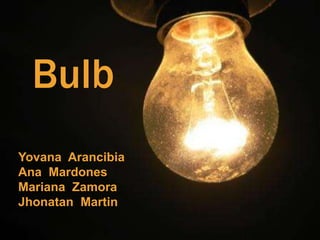
Bulb
- 1. Bulb Yovana Arancibia Ana Mardones Mariana Zamora Jhonatan Martin
- 2. History of the light Bulb In addressing the question of who invented the incandescent lamp, historians Robert Friedel and Paul Israel list 22 inventors of incandescent lamps prior to Joseph Wilson Swan and Thomas Edison. They conclude that Edison's version was able to outstrip the others because of a combination of three factors: an effective incandescent material, a higher vacuum than others were able to achieve (by use of the Sprengel pump) and a high resistance that made power distribution from a centralized source economically viable.
- 3. Parties of theBulb Outline of Glassbulb Lowpressureinert gas (argon, neon, nitrogen) Tungstenfilament Contactwire (goesout of stem) Contactwire (goesintostem) Supportwires Stem (glassmount) Contactwire (goesout of stem) Cap (sleeve) Insulation (vitrite) Electricalcontact
- 4. Manufacturing Early lamps were laboriously hand-assembled; cost of lamps fell after automatic machinery was developed. In manufacturing the glass bulb, a type of "ribbon machine" is used. A continuous ribbon of glass is passed along a conveyor belt, heated in a furnace, and then blown by precisely aligned air nozzles through holes in the conveyor belt into molds. Thus the glass bulbs are created. After the bulbs are blown, and cooled, they are cut off of the ribbon machine. A machine of this sort may be able to produce 50,000 bulbs per hour.
- 5. Thomas Alva Edison Was an American inventor, scientist, and businessman who developed many devices that greatly influenced life around the world, including the phonograph, the motion picture camera, and a long-lasting, practical electric light bulb. Dubbed "The Wizard of Menlo Park" (now Edison, New Jersey) by a newspaper reporter, he was one of the first inventors to apply the principles of mass production and large teamwork to the process of invention, and therefore is often credited with the creation of the first industrial research laboratory. Edison's Menlo Park laboratory complex is said to live on in California's "invention factory" at Silicon Valley.
- 6. Joseph Wilson Swan Sir Joseph Swan was born in 1828 at Pallion Hall in Bishopwearmouth, in 1850 he began working on a light bulb using carbonized paper filaments in an evacuated glass bulb. By 1860 he was able to demonstrate a working device, and obtained a British patent covering a partial vacuum, carbon filament incandescent lamp. However, the lack of a good vacuum and an adequate electric source resulted in an inefficient bulb with a short lifetime. Fifteen years later, in 1875, Swan returned to consider the problem of the light bulb with the aid of a better vacuum and a carbonized thread as a filament. The most significant feature of Swan's improved lamp was that there was little residual oxygen in the vacuum tube to ignite the filament, thus allowing the filament to glow almost white-hot without catching fire. However, his filament had low resistance, thus needing heavy copper wires to supply it
- 7. Videos